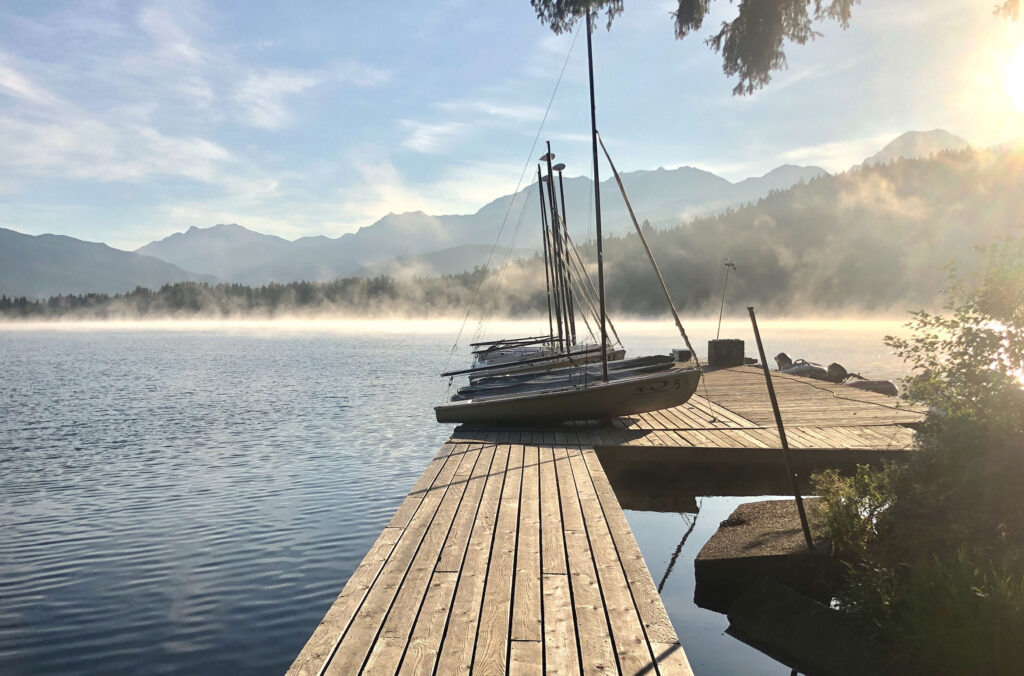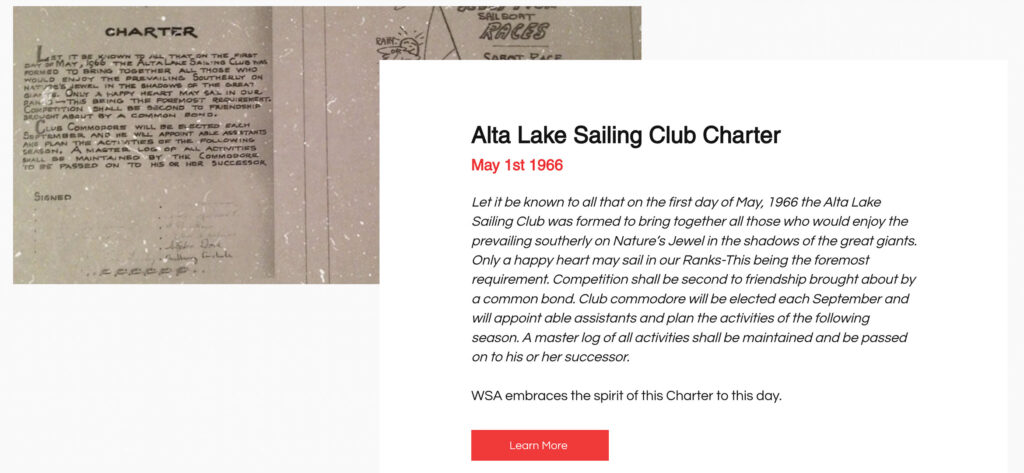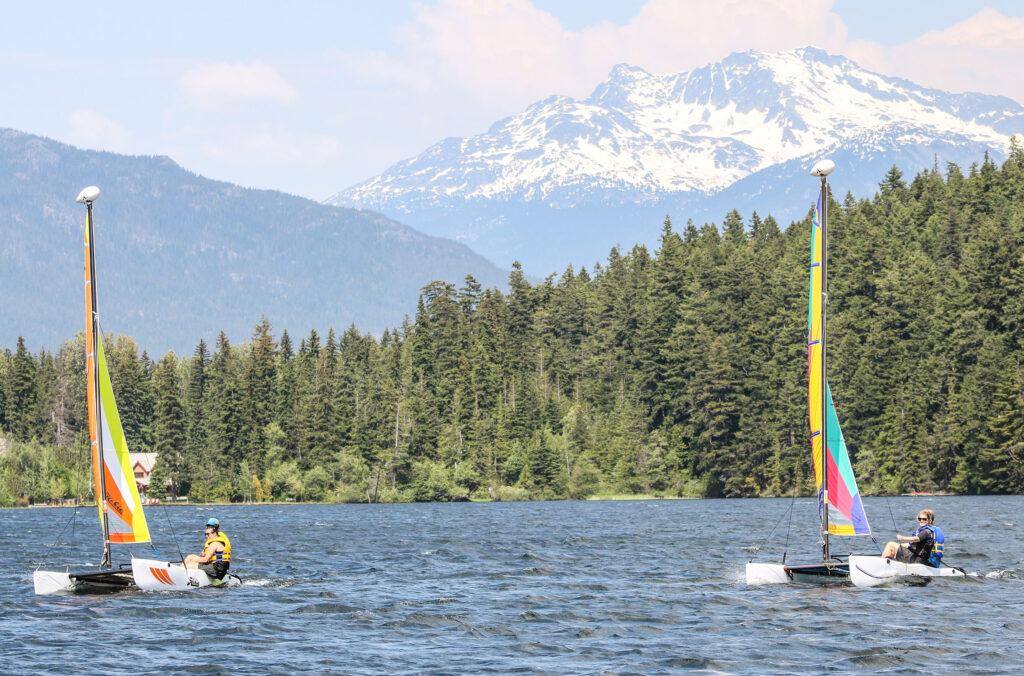Whistler is well known for its laid-back lake culture, with mountains, trees, docks and fresh water providing many idyllic spots to hang out and relax on a warm sunny day. What people might not know is that the north end of Alta Lake is also home to a reliable afternoon thermal, making it the perfect place to learn and practise sailing.
The History of Sailing in Whistler
Alta Lake, formerly Summit Lake, was the site of Whistler’s first permanent tourist operation, Rainbow Lodge. Myrtle and Alex Philip, a young entrepreneurial couple from Maine, opened the fishing lodge of their dreams in 1914 on the site where Rainbow Park now sits. Geographically isolated from other communities, lodge guests arrived by train on the Pacific Great Eastern railroad. Aside from walking, illegally, along the newly formed railroad, the easiest way to get around town was by water, and boating was a core component of life at Rainbow Lodge.

Every morning fresh milk and cream had to be boated over from nearby Tapley’s Farm for guests’ breakfasts. Myrtle also relied on catching fish to feed her guests, especially in the winter when other protein sources were scarce. One winter she sprained her ankle badly, so together with her dad she rigged a rudimentary sail onto a wooden raft, allowing her to sail back and forth across the frozen lake to her fishing holes and prevent her guests from going hungry.

As Whistler became more accessible by road, sailing became less about transport and more about sport and recreation. In 1966 the Alta Lake Sailing Club was formed and operated out of the popular Cypress Lodge at the north end of Alta Lake.
Their flagship annual event, the Whistler Regatta, was first held in 1965 and continues to this day. Held in late August, it was nicknamed the “Regretta” for the regret the community feels as summer comes to a close.
The non-profit Whistler Sailing Association was formed in 2008 by a group of local dinghy* enthusiasts and continues to operate out of the same building next to The Point Artist-Run Centre. Today the association has grown into a fully accredited sailing school offering summer sailing programs for kids and youth, and adult programming including learn to sail and race nights.
*A dinghy is a small sailboat that doesn’t have a weighted keel. They’re light, manoeuvrable boats that require more athleticism and help you to hone your skills. Most of the boats sailed in the Olympics are dinghies.
Whistler Sailing holds weekly club races throughout the summer. The Wednesday Night Races kick off at 6:15 PM and the series is open to all racing and season pass members. Drop-in attendance is allowed at a minimal fee per person and all participants must have a basic membership to the non-profit organization.
While racing is a great way to test your skills as a sailor, Whistler Sailing’s GM Francois Hebert is passionate about encouraging more people to take up sailing and is focused on teaching beginners and those looking to hone their existing techniques.
Learning to Sail in Whistler
Francois grew up sailing on the Great Lakes with his parents and learnt to sail when he was eight years old. Recently crowned the 2023 ILCA 7 US Masters National Champion, he spent many years coaching all over but saw an opportunity to start his own sailing school in Whistler because of Alta Lake’s special location. The wide expanse of fresh water, combined with the wind, makes Alta Lake the perfect place to learn to sail.
“It’s in a geographic aspect of the valley where it really narrows, creating a bit of a funnel,” Francois says. “And the temperature in the valley is what we call a thermal, so whenever Pemberton gets a couple degrees warmer than Whistler, which it typically does every afternoon, then the wind comes. It’s rare to have no wind.”
Whistler Sailing has a variety of programs for people interested in learning to sail. Kids’ week-long summer camps are held every week during July and August and cater to ages five and up. Adults have access to group lessons in June, and private lessons all summer. For those with some sailing experience, you can charter or rent a boat.
Hebert recommends taking the Hobie Wave catamaran, as “it’s a very popular two-hull boat that people are likely familiar with from visiting resorts like Club Med.”
Wing Foiling Lessons in Whistler
Anyone with a medium amount of sailing experience looking to try something different will want to consider the brand-new wing foiling lessons. Combining elements of windsurfing, kiteboarding and surfing, wing foiling offers a unique blend of wind and water dynamics. The new sport is taking off right now and what makes it stand out, literally, from other water sports is the aeroplane technology used to achieve vertical lift.
“You have a sail basically, that’s called a wing, that you control just with your hands, so there’s no mast like a traditional windsurfer. And you stand on what’s called a hydrofoil, so you’re essentially using two wings and one of the wings is underwater,” Francois explains. ‘This little aircraft wing that works under the water pushes you all the way up until your board is flying about a metre above the surface. It’s extremely quiet and an amazing feeling, you really feel like you’re flying.”
Francois’ passion for wing foiling is palpable and it’s an experience he wants to share with others.
“It’s a really great thing that you can do on Alta Lake, it’s windy enough and there’s enough space that it’s a really good place to learn, which is why we’ve started a school for wing foiling.”
Wing foiling lessons begin on dry land, learning how to control the wing in the wind. They then progress to using the board without the foil, before putting all the equipment together for the full wing foiling experience. Whistler Sailing also offer packages that include tow foiling as a way to focus on developing hydrofoil handling skills while still progressing with wing handling.
But, Francois is keen to point out, wing foiling is more geared towards people who have previous sailing experience.
“You need some basic sailing knowledge before going in that direction. If you’ve never sailed before it’s a bit harder because you need some water experience and notion of winds,” says Francois. “But it’s accessible to anyone with even a medium amount of sailing experience.”
After thirty years on the water, Francois credits the multi-dimensional nature of sailing for his life-long love of the sport.
“Sailing is a complex sport in many ways and you can learn new things throughout your whole life. You can always go out on the water and encounter a condition you haven’t seen before. It’s a lot of fun.”
With so many outdoor sports on offer in Whistler, it can sometimes be hard to choose between them. On those hot summer days, nothing beats the natural air conditioning of dry wind hitting cold lake water. Adding sailing to your skill set might just open up a new way to explore.
Spring savings are calling! There’s so much to see and do in spring, you’ll want plenty of time for fun in the sun. Extend your stay and book midweek for increased savings, with 3 nights starting from $135 CAD per night. Coming during Nourish? Book 3+ nights between May 29 and June 30, 2025, to receive a free $100 or $200 Wellness Activity Voucher, valid for use on wellness activities or Nourish Whistler Wellness Series tickets.
For summer, book ahead and save up to 25% on lodging. Plus, you'll receive a free $100 CAD Activity Voucher on stays of 3 or more nights ($200 for 5 nights). You can also win a summer trip to Whistler with the Escape the Ordinary contest!
Insider Tip: Sign up for Whistler Rewards to access additional savings and exclusive perks.


